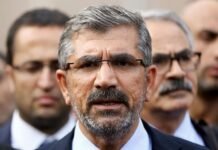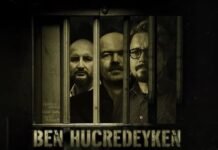A medical doctor who was assigned to conduct physical examinations in a gymnasium-turned-mass detention center following a failed coup in Turkey in 2016 spoke for the first time about the torture he witnessed and recorded there to the Bold Medya news website in an interview with exiled journalist Cevheri Güven.
On the night of July 15, 2016 some elements of the Turkish Armed Forces staged a coup attempt in Turkey that left 241 dead and more than 2,000 wounded. The coup attempt was suppressed by the government the same night.
Turkish President Recep Tayyip Erdoğan pinned the blame for the failed coup on his arch-foe, the Gülen movement, a faith-based dissident group that he had designated as a terrorist organization, and its spiritual leader Fethullah Gülen, an Islamic cleric living in a retreat in the US state of Pennsylvania. Gülen has categorically denied any involvement in the abortive putsch or in any violent or terrorist activity.
The Turkish government’s response to the coup attempt was swift and harsh. Immediately after the military uprising was put down, the government initiated an unprecedented wave of arrests targeting mostly real and perceived members of the movement, a purge that hit other segments of society as well.
As part of the post-coup purge, the Turkish government dismissed more than 150,000 civil servants from state jobs and investigated almost 600,000 people, detaining or arresting half of them on trumped-up terrorism-related charges.
The gym run by the Ankara Police Department was used as a detention center after the coup attempt by its Anti-Terrorism Department (TEM), where hundreds of detainees, civilian and military alike, were held and tortured.
As a matter of fact, two sites in Ankara were used as detention centers where torture was engaged in on a massive scale: the gym, and the Equestrian Sports Club in Ankara’s Beştepe district.
Harsh methods of torture such as rape, sexual assault, severe beatings, sleep deprivation, stress positions, use of cold pressurized water, deprivation of food and water and threats to kill or rape were resorted to in the gym, where 800 to 1,000 people were detained at the same time, a fact evidenced by the UN special rapporteur on torture and other cruel, inhuman or degrading treatment or punishment in a report based on his mission to Turkey between November 27 and December 2, 2016.
Some of the victims held in the mass detention center had the opportunity to recount the torture they had suffered once they were arraigned in court.
In addition, Erhan Doğan, a civilian who was tortured at the gym, was the first victim to speak openly to the media. He said, among other things, he heard the screams of women being raped.
For the first time a government official, a medical doctor who was assigned to the gym as a “forensic examination doctor” as required by domestic law and international conventions, detailed the torture he witnessed and recorded there. He requested anonymity for security reasons.
“When I entered the partition separated by curtains between the gym and the TEM I was met with a terrible scene. There were doctors sitting at several tables, [detained] soldiers were lined up in a single row. There was a soldier in front of the doctors, unable to stand on his feet, writhing in agony on the ground. The police lifted him up, but he fainted and fell again. He had probably suffered a head injury. I was in shock upon seeing this. Later I saw many military personnel who had sustained injuries to the head,” he said in describing the situation.
He had to pass through the gym when he was led to the room assigned to doctors for medical examinations. “I saw some 700 to 800 military personnel including high ranking officers and generals lying on the wooden floor of the gym in their underwear, packed like sardines and handcuffed from behind.”
“They piled up the clothes of the detained soldiers in a corner of the gym. … Between 9 p.m. and 9 a.m. until I handed over the shift I tried to the best of my ability to examine the detained soldiers and write medical reports based on my examinations,” he said.
All the soldiers were battered
According to the doctor all the soldiers were battered, albeit to varying degrees. “I asked them when they were brought before me whether they had been beaten, as we always ask in forensic examinations. All the soldiers replied, ‘No beating, no violence,’ out of fear. I examined them all the same and recorded in my report all bruises and lesions I detected on their bodies. However, I left the section pertaining to my findings as to the existence of beating or violence blank, or wrote ‘No beating or violence.’ I had no other choice, given their answers in the negative.”
At one point, a pot-bellied police officer threatened him, seeing him continuously asking detainees whether they were beaten.
“I saw Lt. Col. Ümit Gencer, whose pictures were aired on TV on the night of the coup attempt, there. He was completely ruined. One of his eyes had collapsed inwards. His orbital bone was probably fractured by a severe punch in the eye. His face was totally battered. I still regret not asking for a tomography, but it somehow didn’t occur to me. I wrote Gencer’s report in detail. But they set that report aside and probably destroyed it later. As a matter of fact, I believe they had all my reports subsequently replaced by reports written by another doctor.
“They brought a tall, muscular man they said was an F-16 pilot. I think he was Lt. Col. Hakan Karakuş, the son-in-law of Gen. Akın Öztürk [former commander of the Turkish Air Forces arrested after the coup attempt]. His forehead was noticeably swollen. He could not stand on his feet; they lifted him up and he fell again. His skull was probably fractured. A police doctor said, ‘Let him die.’ He had to be taken to intensive care. I asked a neurosurgeon if he would send him to the hospital. He said they were sending him to the infirmary instead. In the morning I asked the neurosurgeon if he had checked in on him. He said, ‘He is fine,’ dismissing my question.”
‘My greatest regret’
“They brought three soldiers in their underwear. I asked them whether they had any complaints. They pointed at their small of their backs, saying under their breath that they hurt. Normally, they would say “No beating, no violence” out of fear as expected. But when they said ‘The small of our backs hurts’ instead, it raised a flag. I slightly lowered the back of their underpants and looked superficially at the upper part of their hips, which we call the sacrum, and examined them only visually, then said, “There is nothing visible in the small of your backs.
“It did not occur to me they meant their rectum when they said the small of their backs hurt and that they might have been raped with a police truncheon. It was my first such experience, and I had no idea what torture methods were used by the police. Police officers and other doctors were present. When I said there seems to be no problem, they shook their head sadly. Most probably there was rape and the soldiers tried to explain their troubles that way, but I could not understand that at the time. This is my greatest regret about that night.”
















